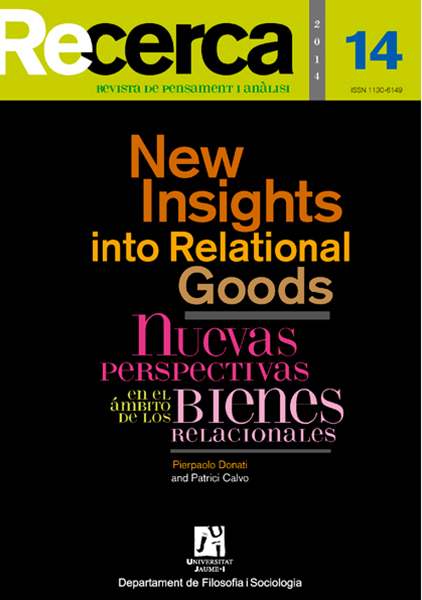The commons from a critical social systems perspective
Contenido principal del artículo
Resumen
This paper is an attempt to theorise the commons from a perspective that sets out for reconciling systemism with a critical stance. According to that the concept of the commons is not only descriptive but also normative. The commons are defined as the systemic effect of synergy in social systems. However, the more suppression and exploitation are ruling, the higher is the extent of exclusion of actors from self-organised generation and usage of the synergetic effect, that is, the higher the extent of enclosure of the commons. Actually, the trend towards the enclosure of the commons is all-embracing and besets every subsystem of society. The critical stance of that theoretical position manifests itself in the endorsement of the reclaiming of the commons as a step towards the implementation of a good society.
Este artículo es un intento de teorizar los comunes desde una perspectiva que pretende reconciliar el systemism con una postura crítica. De acuerdo con esto, el concepto de los comunes no es solo descriptivo sino también normativo. Los comunes son definidos como el efecto sistémico de la sinergia en los sistemas sociales. Sin embargo, mientras mayor represión y explotación reinen, más amplio es el alcance de la exclusión de los actores por los efectos sinérgicos en cuanto a su uso y producción auto-organizada, es decir, mayor será la extensión del cercamiento de los comunes. De hecho, la tendencia hacia el cercamiento de los comunes es global y asedia a todos los subsistemas de la sociedad. La postura crítica de esa posición teorética se manifiesta por sí misma en el respaldo de las reivindicaciones de los comunes como un paso hacia la implementación de una buena sociedad.
Descargas
Detalles del artículo
Citas
Shell Jugendstudie (2010): Jugend 2010. Eine pragmatische Jugend behauptet sich [http://www.shell.de/aboutshell/our-commitment/shellyouth-study/2010.html].
Bloch, E. (1967): Das Prinzip Hoffnung, 3 vols, Frankfurt, Suhrkamp.
Corning, P. (2003): Nature’s Magic, Synergy in Evolution and the Fate of Humankind, Cambridge, Cambridge University Press.
Curtis, N. (2013): Idiotism. Capitalism and the Privatisation of Life, London, Pluto Press.
Donati, P. (2008): «Discovering the Relational Character of the Common Good» in Archer, M. S. and P. Donati (eds.) (2008): Pursuing the Common Good: How Solidarity and Subsidiarity Can Work Together, Vatican City, Vatican Press.
— (2011): Relational Sociology. A New Paradigm for the Social Sciences, Milton Park, UK, Routledge.
Graeber, D. (2012): Inside Occupy, Frankfurt, Campus
Heinzlmaier, B. (2012): Keine Mission, keine Vision, keine Revolution? Die postmoderne Jugend zwischen Pragmatismus und Idealismus [http://jugendkultur.at/wp-content/uploads/keine_mission_heinzlmaier_2012.pdf].
— (2013): Performer, Styler, Egoisten–Über eine Jugend, der die Alten die Ideale abgewöhnt haben, Berlin, Archiv der Jugendkulturen Verlag.
Hofkirchner, W. (2011): «Information and Communication Technologies for a Good Society» in Haftor, D. M. andA. Mirijamdotter (eds.) (2011): Information and Communication Technologies, Society and Human Beings: Theory and Framework, Hershey, Pennsylvania, Information Science Reference.
— (2013a): Emergent information. A Unified Theory of Information framework, Singapore, World Scientific.
— (2013b): «Self-Organisation as the Mechanism of Development and Evolution in Social Systems» in Archer, M.S. (ed.) (2013): Social Morphogenesis, Dordrecht, Springer.
— (2013c): «Potentials and Risks for Creating a Global Sustainable Information Society» in Fuchs, C. and M. Sandoval (eds.) (2013): Critique, Social Media and the Information Society, London and New York, Routledge (in press).
Hurrelmann, K. et al. (2006): «Eine pragmatische Generation unter Druck –Einführung in die Shell Jugendstudie 2006» in Hurrelmann, K. et al. (eds) (2006): Jugend 2006. 15. Shell Jugendstudie, Frankfurt am Main, Fischer Taschenbuch Verlag.
Integral, T-Factory (2013): Manche wollen mehr Sicherheit, manche mehr Erlebnis und Abenteuer – aber alle Jugendmilieus arrangieren sich mit einer komplexen Welt, Medieninformation [http://www.integral.co.at/downloads/Pressetext/2013/04/Pressetext_Sinus_Milieu_Jugendstudie_2013_-_Apr_2013.pdf].
Kraushaar, W. (2012): Der Aufruhr der Ausgebildeten. Vom Arabischen Frühling bis zur Occupy-Bewegung, Hamburg, Hamburger Edition.
Marx, K. (1843): A Contribution to the Critique of Hegel’s Philosophy of Right. Introduction [http://www.marxists.org/archive/marx/works/1843/critique-hpr/intro.htm].
— (1852): The Eighteenth Brumaire of Louis Bonaparte [http://www.marxists.org/archive/marx/works/1852/18th-brumaire/ch01.htm].
— (1894): Capital, Vol. III. [http://www.marxists.org/archive/marx/works/1894-c3/ch48.htm].
Merton, R. K. (1973): The Sociology of Science: Theoretical and Empirical Investigations, Chicago, University of Chicago Press.
Negt, O. (2012): Der politische Mensch. Demokratie als Lebensform, Göttingen 2012 [http://www.ams.at/_docs/001_am_bildung_0112.pdf.10].
Peirce, C. S. (2000): Semiotische Schriften, Frankfurt am Main, Suhrkamp.
Tudyka, K. P. (1973): Kritische Politikwissenschaft, Stuttgart, Kohlhammer.
Wan, P.Y-Z. (2011): Reframing the Social. Emergentist Systemism and Social Theory. Farnham, uk, Ashgate.


